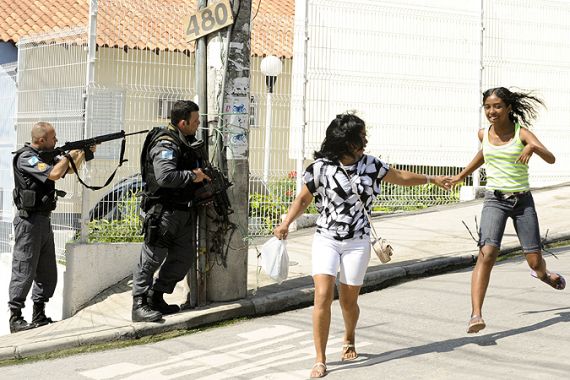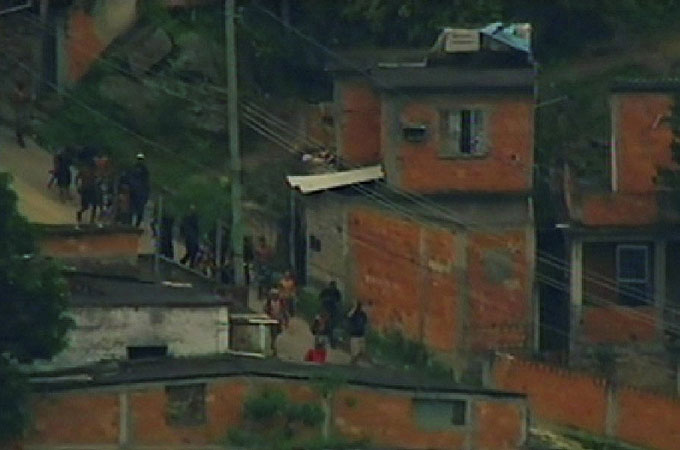Brazil police ‘retake’ Rio slum
Dozens killed as security forces claim victory over drug gangs for control of the biggest shantytown in Rio de Janiero.

 |
| The drug gangs sprayed machine gun fire at police posts and torched vehicles during the deadly crackdown [AFP] |
Police say they have retaken a sprawling slum area from drug gangs in Brazil’s second-largest city after a five-day assault that killed more than two dozen people.
The government sent armoured military vehicles with high-calibre machine guns into Vila Cruzeiro, a major shantytown in northern Rio de Janeiro, in a concerted crackdown on drug gangs.
Police said armoured vehicles backed by helicopters, snipers and thousands of heavily armed men from the military police and navy, with another 17,500 reinforcements were “on alert” for the operation.
At least 30 suspected drug traffickers were reportedly killed since the operation began on Sunday.
“At this moment, Vila Cruzeiro belongs to the state,” Rodrigo Oliveira, a police spokesman, said late on Thursday, adding that forces remained on alert.
Police said gangs fought back with machine guns and torched at least 60 vehicles, including nearly a dozen city buses.
Al Jazeera’s Gabriel Elizondo, reporting from Rio de Janeiro, said the area looked like a war zone with deserted streets after security forces warned slum-dwellers not to leave their homes.
“This has been one of the bloodiest weeks in recent memory in Rio de Janeiro and many people here are worried that the worst might still be to come,” said our correspondent.
Violent crackdown
Brazilians have been glued to the continuous coverage of the violence on local television, which has shown buses engulfed in flames and elite police units battling their way through the slums.
|
“The finger that pulls the trigger is not the same as the one that counts the money from arms smuggling, and in that sense the government appears to be concerned with only one of them” Marcelo Freixo, Rio state deputy, critical of police tactics |
Scores of men with packs and automatic rifles were seen scrambling up the hills beyond the slum, with many escaping in cars and on motorcycles.
Many had come to Vila Cruzeiro to escape fighting in nearby districts, and it was not immediately clear whether the police had defeated the gangs or merely sent them scattering off to fight another day.
“We’ve taken an important step, but nothing’s been won,” Jose Beltrame, the state security chief, said.
“It’s important to arrest people, to gather up drugs and ammunition, but it’s more important to get them out of the territory,” he said, referring to the drug traffickers that rule many of Rio’s largest slums.
But Marcelo Freixo, a state deputy from Rio and longtime critic of local police tactics, said the operation would accomplish little.
“The police can enter Vila Cruzeiro and kill another hundred, but that won’t solve the problem in Rio de Janeiro,” he told AFP.
“The finger that pulls the trigger is not the same as the one that counts the money from arms smuggling, and in that sense the government appears to be concerned with only one of them.”
Police said they were battling two factions of drug dealers that have joined forces seeking to disrupt a two-year-old pacification programme aimed at wresting the densely-populated areas from the gangs’ grip.
Long overdue
At least 180 people have been detained since the violence erupted on Sunday. Many of those detained were caught holding bottles of gasoline, according to police, who said they had also seized weapons and drugs.
 |
| Brazil’s slums or “favelas” have long suffered from drug violence and serious crimes [Reuters/TV Globo] |
Residents were shocked at the scale of the crackdown, but welcomed what they said was long-overdue action to combat the drug gangs.
“I’ve never seen anything like this! It’s a real war operation,” said Elias, a 44-year-old principal. “But it is necessary. This is the only way to confront the drug traffickers.”
Some, however, blamed local authorities for allowing the situation to fester and attributed their new-found urgency to Brazil’s hosting of the 2014 World Cup and then the Olympics two years later.
Around two million of Rio’s inhabitants – a third of the population – live in more than 1,000 slums, locally known as “favelas”.
Authorities hope to pacify 100 of the most violent ones by 2014.
In October 2009 drug gangs shot down a police helicopter near the Maracana stadium – one of the main sites of the upcoming World Cup – killing three officers.